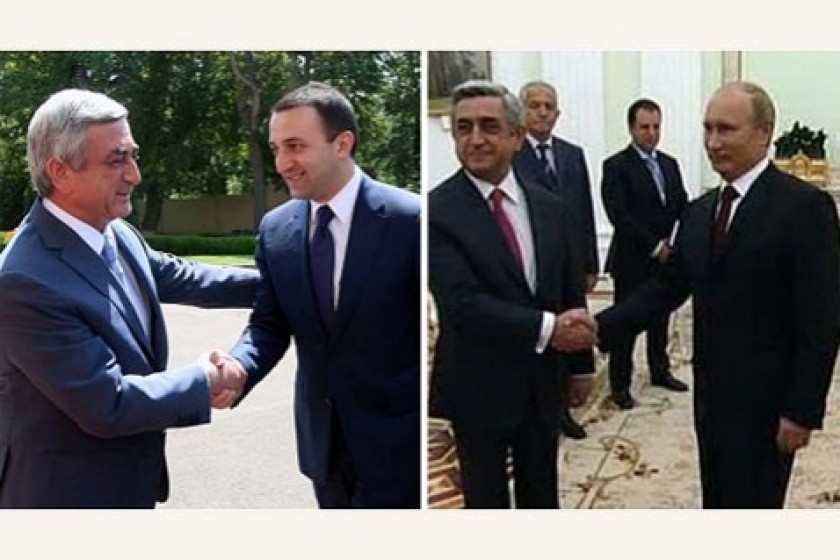
De-escalating the Caucasus: Armenia's Potential Role in Normalizing Russo-Georgian Relations
By Pietro A. Shakarian
After his election as Georgia's prime minister in October 2012, Bidzina Ivanishvili vowed to repair relations with Russia.
The Georgian billionaire sought to undo the damage caused by his predecessor, the staunchly pro-Western Mikheil Saakashvili, who recklessly led his country into a disastrous war in 2008.
While speaking in favor of a balanced relationship between Russia and the West in a January 2013 interview, Ivanishvili stated that, in this respect, "I think Armenia is a good example for Georgians. We can only be jealous about it. Armenia manages good relations with Russia and also manages to stay on good terms with the United States and other NATO countries."
Despite the fact that Saakashvili remained the nominal head-of-state, there were promising signs that Ivanishvili's "Armenia way" was a successful policy and that a major thaw in ties with Moscow was around the corner.
Among other things, he publicly supported opening the Abkhaz railway which directly connected Armenia with Russia in Soviet times; a move that was well-received in Yerevan. Though he kept NATO and the EU on the table for Georgia, likely as bargaining chips with Moscow for a future peace with the breakaway regions of Abkhazia and South Ossetia, Ivanishvili also openly considered joining the Moscow-backed Eurasian Union.
In the 2013 Georgian presidential election, Saakashvili was finally defeated by an Ivanishvili political ally, Giorgi Margvelashvili.
Meanwhile, Ivanishvili stepped down from his post, appointing then 31-year-old Irakli Garibashvili his successor. Both sought to continue Ivanishvili's balanced policies toward Russia. This was received positively in Moscow. The zenith of the Russo-Georgian thaw came during the 2014 Sochi Olympics when Russian President Vladimir Putin personally invited Georgian President Margvelashvili for a direct one-on-one meeting.
However, considering the crisis in Ukraine and moves that were made by the US and the EU to enhance their geopolitical presence in the former Soviet space, these diplomatic efforts have stalled.
The Putin-Margvelashvili meeting remains on hold. Meanwhile, a non-resolution and the status-quo leave the region vulnerable to potential danger. Moscow has already started to signal an interest in a military alliance with Georgia's breakaways while Washington seeks to enhance military ties with Tbilisi, which is still formally pursuing NATO membership. If these divisions become more entrenched and militarized over time, it could become very dangerous for the Caucasus region.
Armenia can help to de-escalate the situation. Yerevan is in a unique position in this regard because it is the one country regionally with which both Moscow and Tbilisi maintain good relations. Armenia maintains both a strong economic and security relationship with Russia, and strong economic, historical, and cultural ties with Georgia.
In fact, during Georgian Prime Minister Garibashvili's recent visit to Yerevan in August, relations between Armenia and Georgia were hailed by both sides as being better than at any other point in recent history. In a statement, Garibashvili said that "Armenia is not only Georgia's neighbor but also friend."
Therefore, Armenia’s President Sargsyan could help the Russian and Georgian leaderships realize the postponed Putin-Margvelashvili meeting by hosting a summit between Moscow and Tbilisi; perhaps at the spa town of Dilijan.
In principle, Yerevan has supported better relations between its northern neighbors in the past. However, by actually bringing the leaders of both states together for talks, it would be translating its positions into diplomatic action, therefore making a significant contribution to the improvement of Russo-Georgian relations.
Hosting such a summit would also be beneficial for Yerevan in two respects. First, a rapprochement may finally start the process of reopening of the Abkhaz railway, which in turn would give Armenia greater access to Russian and European markets. Second, it would prevent an increasing militarization of the region between Russia and NATO that could, in the ultimate nightmare scenario, involve the presence of nuclear arms. In this regard, Armenia could play a very important role in preventing a crisis in the Caucasus.
Within the discourse of the Caucasus, there are debates on what regional-geopolitical orientation there should be: from East-to-West (Azerbaijan, Armenia, Georgia, and Turkey) or from North-to-South (Russia, Georgia, Armenia, Azerbaijan, and Iran).
However, instead of exclusively choosing one or the other, both can be pursued. The more open borders, free trade and regional dialogue there are, the better it will be for the Caucasus region as a whole.
Yerevan can play a key role in this by pursuing both East-West and North-South regional cooperation simultaneously. It can at once continue crucial dialogue with Turkey, while simultaneously bringing both Georgia and Russia to the negotiating table.
The geopolitical benefits for Yerevan would be optimal.
Photo: Sargsyan and Garibashvili, Sargsyan and Putin
Pietro A. Shakarian is an MA graduate student at the Center for Russian, East European, and Eurasian Studies (CREES) at the University of Michigan in Ann Arbor. He earned his BA in History from John Carroll University in 2012 and his MLIS from Kent State University in 2013. He also serves as a member of the editorial board for the Gomidas Institute in London and has written analyses on Russia and the former USSR for The Nation and Russia Direct.
 Videos
Videos Photos
Photos




Comments (1)
Write a comment